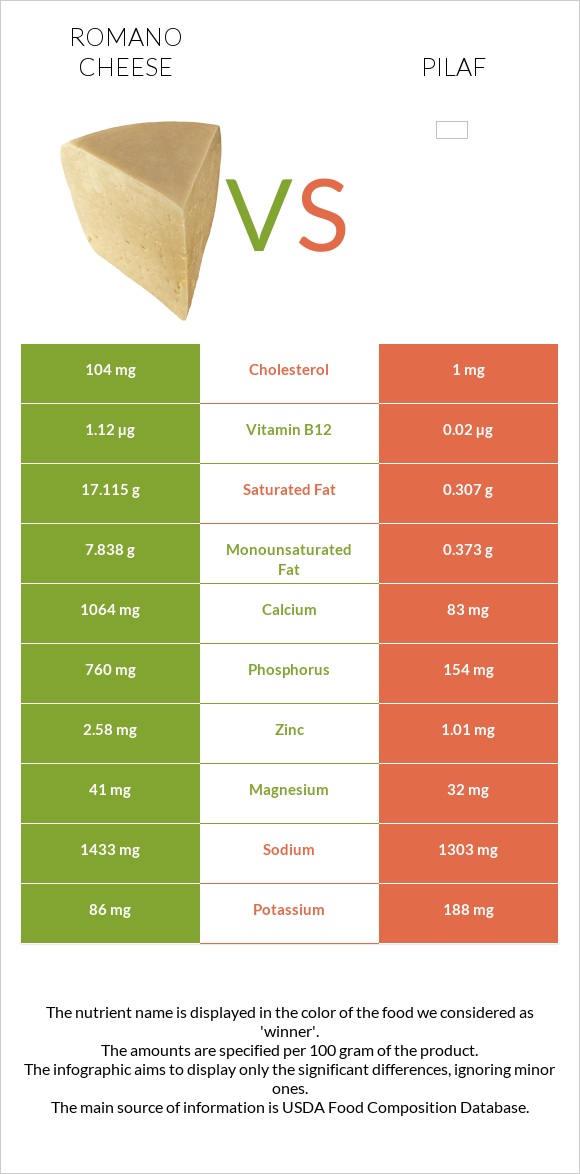Romano cheese vs. Pilaf — In-Depth Nutrition Comparison
Compare
Significant differences between romano cheese and pilaf
- Romano cheese has more calcium, phosphorus, and vitamin B12; however, pilaf is richer in folate, vitamin B1, vitamin B3, manganese, and selenium.
- Romano cheese covers your daily calcium needs 98% more than pilaf.
- Pilaf has 104 times less cholesterol than romano cheese. Romano cheese has 104mg of cholesterol, while pilaf has 1mg.
- Pilaf has a higher glycemic index. The glycemic index of pilaf is 60, while the glycemic index of romano cheese is 27.
Specific food types used in this comparison are Cheese, romano and Rice and vermicelli mix, rice pilaf flavor, unprepared.
Infographic

Infographic link
Mineral Comparison
Mineral comparison score is based on the number of minerals by which one or the other food is richer. The "coverage" charts below show how much of the daily needs can be covered by 300 grams of the food.
| Contains more MagnesiumMagnesium | +28.1% |
| Contains more CalciumCalcium | +1181.9% |
| Contains more ZincZinc | +155.4% |
| Contains more PhosphorusPhosphorus | +393.5% |
| Contains more PotassiumPotassium | +118.6% |
| Contains more IronIron | +216.9% |
| Contains more CopperCopper | +453.3% |
| Contains more ManganeseManganese | +4310% |
| Contains more SeleniumSelenium | +123.4% |
Vitamin Comparison
Vitamin comparison score is based on the number of vitamins by which one or the other food is richer. The "coverage" charts below show how much of the daily needs can be covered by 300 grams of the food.
| Contains more Vitamin AVitamin A | +2300% |
| Contains more Vitamin EVitamin E | +475% |
| Contains more Vitamin DVitamin D | +∞% |
| Contains more Vitamin B2Vitamin B2 | +325.3% |
| Contains more Vitamin B12Vitamin B12 | +5500% |
| Contains more Vitamin KVitamin K | +340% |
| Contains more Vitamin CVitamin C | +∞% |
| Contains more Vitamin B1Vitamin B1 | +1529.7% |
| Contains more Vitamin B3Vitamin B3 | +7857.1% |
| Contains more Vitamin B5Vitamin B5 | +68.6% |
| Contains more Vitamin B6Vitamin B6 | +370.6% |
| Contains more FolateFolate | +2928.6% |
All nutrients comparison - raw data values
| Nutrient |  |
 |
DV% diff. |
| Calcium | 1064mg | 83mg | 98% |
| Phosphorus | 760mg | 154mg | 87% |
| Saturated fat | 17.115g | 0.307g | 76% |
| Folate | 7µg | 212µg | 51% |
| Vitamin B1 | 0.037mg | 0.603mg | 47% |
| Vitamin B12 | 1.12µg | 0.02µg | 46% |
| Protein | 31.8g | 10.42g | 43% |
| Fats | 26.94g | 1.37g | 39% |
| Vitamin B3 | 0.077mg | 6.127mg | 38% |
| Manganese | 0.02mg | 0.882mg | 37% |
| Cholesterol | 104mg | 1mg | 34% |
| Selenium | 14.5µg | 32.4µg | 33% |
| Starch | 71.23g | 29% | |
| Carbs | 3.63g | 76.31g | 24% |
| Vitamin B6 | 0.085mg | 0.4mg | 24% |
| Vitamin B2 | 0.37mg | 0.087mg | 22% |
| Iron | 0.77mg | 2.44mg | 21% |
| Monounsaturated fat | 7.838g | 0.373g | 19% |
| Copper | 0.03mg | 0.166mg | 15% |
| Zinc | 2.58mg | 1.01mg | 14% |
| Vitamin A | 96µg | 4µg | 10% |
| Sodium | 1433mg | 1303mg | 6% |
| Vitamin B5 | 0.424mg | 0.715mg | 6% |
| Vitamin C | 0mg | 4.1mg | 5% |
| Fiber | 0g | 1.2g | 5% |
| Vitamin D | 20 IU | 0 IU | 3% |
| Potassium | 86mg | 188mg | 3% |
| Vitamin D | 0.5µg | 0µg | 3% |
| Magnesium | 41mg | 32mg | 2% |
| Calories | 387kcal | 359kcal | 1% |
| Vitamin E | 0.23mg | 0.04mg | 1% |
| Vitamin K | 2.2µg | 0.5µg | 1% |
| Polyunsaturated fat | 0.593g | 0.377g | 1% |
| Net carbs | 3.63g | 75.11g | N/A |
| Sugar | 0.73g | 1.53g | N/A |
| Choline | 15.4mg | 17.5mg | 0% |
| Tryptophan | 0.429mg | 0.086mg | 0% |
| Threonine | 1.171mg | 0.221mg | 0% |
| Isoleucine | 1.685mg | 0.279mg | 0% |
| Leucine | 3.071mg | 0.523mg | 0% |
| Lysine | 2.941mg | 0.189mg | 0% |
| Methionine | 0.852mg | 0.145mg | 0% |
| Phenylalanine | 1.71mg | 0.32mg | 0% |
| Valine | 2.183mg | 0.374mg | 0% |
| Histidine | 1.231mg | 0.15mg | 0% |
Macronutrient Comparison
Macronutrient breakdown side-by-side comparison
Protein:
31.8 g
Fats:
26.94 g
Carbs:
3.63 g
Water:
30.91 g
Other:
6.72 g
Protein:
10.42 g
Fats:
1.37 g
Carbs:
76.31 g
Water:
8.04 g
Other:
3.86 g
| Contains more ProteinProtein | +205.2% |
| Contains more FatsFats | +1866.4% |
| Contains more WaterWater | +284.5% |
| Contains more OtherOther | +74.1% |
| Contains more CarbsCarbs | +2002.2% |
Fat Type Comparison
Fat type breakdown side-by-side comparison
Saturated fat:
Sat. Fat
17.115 g
Monounsaturated fat:
Mono. Fat
7.838 g
Polyunsaturated fat:
Poly. Fat
0.593 g
Saturated fat:
Sat. Fat
0.307 g
Monounsaturated fat:
Mono. Fat
0.373 g
Polyunsaturated fat:
Poly. Fat
0.377 g
| Contains more Mono. FatMonounsaturated fat | +2001.3% |
| Contains more Poly. FatPolyunsaturated fat | +57.3% |
| Contains less Sat. FatSaturated fat | -98.2% |





